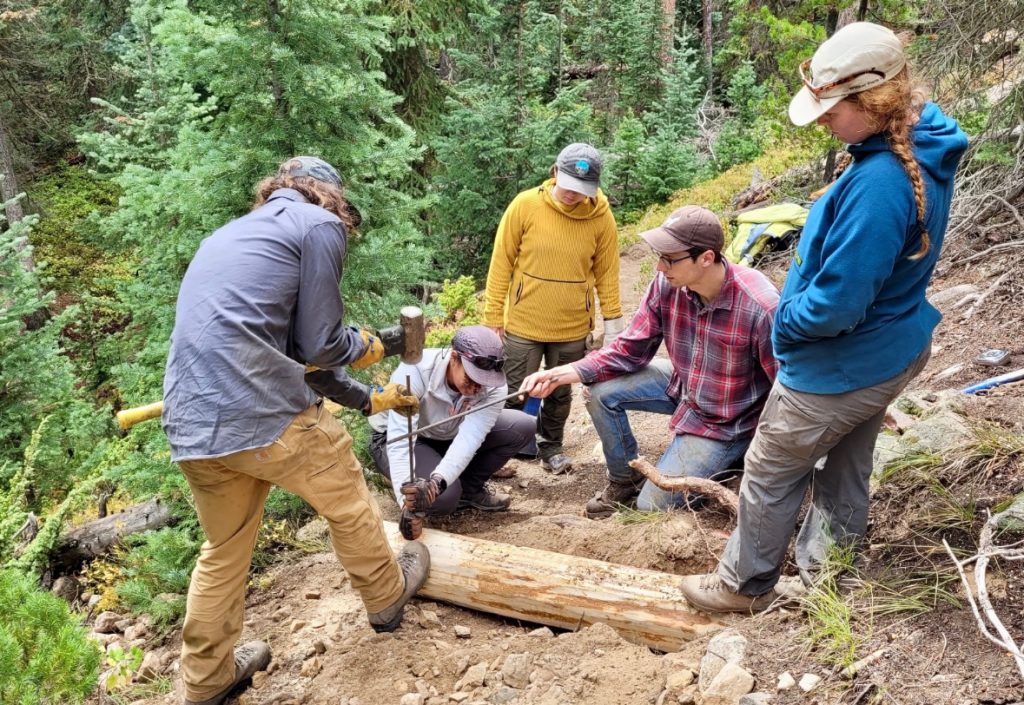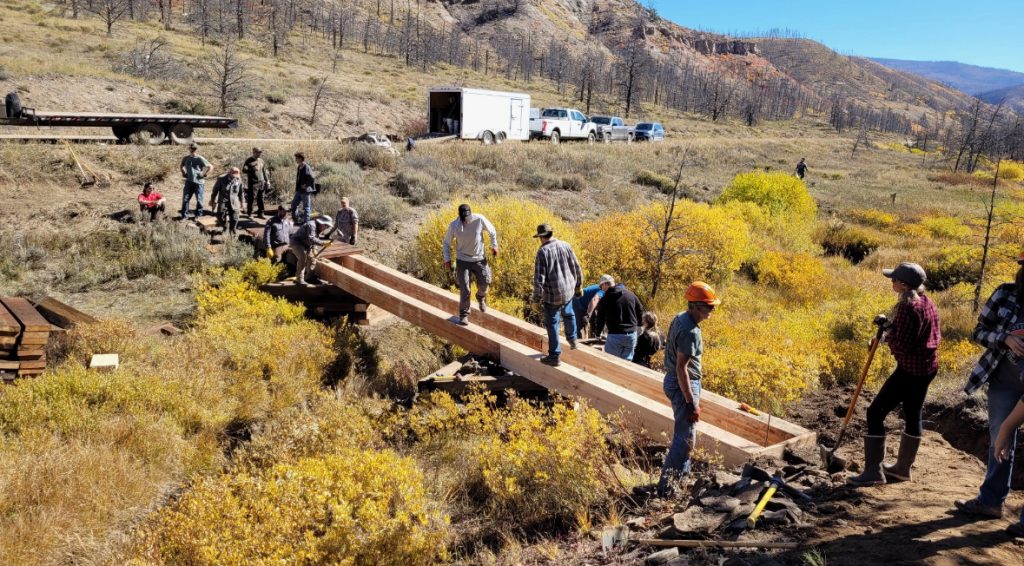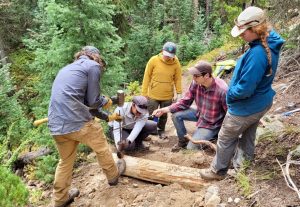Amid government shutdown, Colorado nonprofits describe ‘chaos’ and a ‘scramble to protect the places we love’
Nonprofits that work closely with U.S. Forest Service have received mixed messages about whether volunteers can work on National Forest lands during the shutdown

Headwaters Trails Alliance/Courtesy photo
Editor’s Note: This article has been updated to correct the name of the Eagle-Summit Wilderness Alliance.
On the eve of the government shutdown, Headwaters Trails Alliance Executive Director Meara McQuain pulled an all-nighter.
Already this year, McQuain said the Grand County nonprofit was forced to scrap its plans for the summer season and to cancel multiple projects due to staffing cuts at the U.S. Forest Service and Bureau of Land Management. In an effort to keep next season on track, she rushed last week to submit federal grant proposals before workers were furloughed and government operations ground to a halt.
“There’s a lot of scrambling that was happening in the days leading up to the potential shutdown,” McQuain said. “That really impacted us. It impacted me, personally, because I’m the one writing grants and developing projects and proposals for next year.”
In Colorado’s mountain communities, where the federal government owns a majority of the land, nonprofits stepped up over summer to fill gaps left by the steep cuts President Donald Trump’s administration has made to the federal government.
Amid the government shutdown, those same nonprofits are again navigating uncertainty as they continue to take on new responsibilities and see projects postponed due to a lack of federal workers.
As the busy leaf peeping season winds down on Independence Pass, a nonprofit leader there has taken over the responsibility of cleaning and stocking a Forest Service bathroom due to the shutdown.
While some nonprofit trail groups have started to wrap up their field season, others had projects planned in October that are being postponed — potentially to next season — since federal workers have been furloughed. Still, at least one volunteer project in the mountains is advancing because it is related to Trump’s executive order to increase timber production.
Even as nonprofit groups have sought to help, they’ve received mixed messages from the federal government whether or not volunteers are allowed to work during the government shutdown.
“With the shutdown, there’s going to be missed funding opportunities, missed planning opportunities,” McQuain said. “With less oversight on the lands and less people working them, maintaining them, we run the risk of digging a hole financially and resource-wise. We’re already very resource-challenged in both staffing and funding, and it stands to make that situation even worse.”
Confusion over volunteers
When the shutdown first began, the Eagle-Summit Wilderness Alliance — a nonprofit that works on the White River National Forest, the nation’s most-visited national forest — received a document from the Forest Service stating that all volunteer activities should cease during the shutdown.
But the nonprofit has since heard from a local ranger district that volunteers are allowed to work, Eagle-Summit Wilderness Alliance member Karn Stiegelmeier said. So, Stiegelmeier said the group has resumed its volunteer activities, including offering wilderness rangers who help to educate the public.

She said the conflicting guidance has left some members of the nonprofit worried that they could get in trouble for volunteering or that the workers compensation usually offered by the Forest Service might not cover them if they were injured while volunteering.
“A lot of us are a little afraid to go out and do anything,” Stiegelmeier said. “That’s the latest in the chaos from the Forest Service.”
Yet, other nonprofits in the Colorado mountain communities have also heard that volunteers are not supposed to be working on federal lands during the shutdown.
This time of year, McQuain said that Headwaters Trails Alliance volunteers are usually wrapping up projects for as long as they can “until the snow flies.” But this year, the nonprofit had to shift late-season volunteer projects planned on federal lands to town or county lands, due to the government shutdown.
Because the Headwaters Trails Alliance has a contract with the Forest Service, she said the nonprofit’s volunteers are allowed to continue working on the national forests, but they’re not allowed to bring volunteers to work on federal lands.
“We’re under the directive that no volunteers may work on our forests,” McQuain said.
Friends of Wilderness, a Routt County nonprofit that works in the Mount Zirkel, Sarvis Creek and Flat Tops wilderness areas, has also been told that volunteers can’t work during the shutdown, the group’s president Laura Foulk said.
Yet, in the same county, a volunteer project that another nonprofit is conducting alongside the Forest Service is moving ahead, undeterred by the shutdown.
The Yampa Valley Sustainability Council plans to move forward with a volunteer project Oct. 16-18 to plant trees in the Big Red Park fire burn scar area in northern Routt County, the nonprofit’s forest resilience projects manager, Dakota Dolan, said.
“This project is moving forward business as usual,” Dolan said. “That’s because the folks I work with at the U.S Forest Service have been exempt from the furlough because their work is required to continue because they work on timber.”
Under the U.S. Department of Agriculture’s plans for a government shutdown, employees implementing Trump’s executive order to increase timber production were exempt from the furloughs.
In a statement Thursday, an unnamed U.S. Department of Agriculture spokesperson said that “volunteer activities may continue under existing agreements.” But the spokesperson did not respond to a follow-up question seeking clarification about why some nonprofits have been told that volunteers can’t work or a question about who qualifies as a volunteer.
“Because of all the government uncertainty and staffing issues, it is such an important time to step up as a volunteer,” Dolan said. “Now, more than ever, volunteering not only for our projects but for anything to support federal operations is so important.”
Additional delays
The government shutdown comes on the heels of the Trump administration’s efforts to downsize the federal government. In the first weeks of his presidency, Trump issued an executive order directing the heads of federal agencies to shrink the size of the federal workforce to eliminate “waste” and “bloat.”
The Department of Government Efficiency soon fired thousands of employees across the federal government, including an estimated 3,400 at the Forest Service. Hundreds more employees have left the federal government through the administration’s deferred resignation program.
On Independent Pass, the cuts led the Forest Service to bow out of its agreement that paid a contractor to clean three bathrooms along the popular scenic road. So, the nonprofit Independence Pass Foundation this summer picked up the about $25,000 bill to have the bathrooms there cleaned.
Amid the government shutdown, Independence Pass Foundation Executive Director Karin Teague said she is now helping to clean and stock a fourth bathroom. Once a week during the shutdown, Teague said she is driving to the vault toilets on Forest Service land at Lincoln Creek Road to stock them with toilet paper and clean them herself.
The nonprofit also had plans to start a project on Oct. 1 to fix a bridge crossing the Roaring Fork River that had been taken out by a fallen tree, Teague said. Because of the shutdown, the project, which required help from a Forest Service road crew, is on hold and could get pushed to next season, she said.
“We’re used to having the Forest Service folks up here,” Teague said. “Owing to the drastic cuts at the Forest Service earlier this year, I think by now the staff at the Aspen-Sopris Ranger District is probably down to under 50%. They’re not really as present up here as I know they want to be.”
In Grand County, McQuain said the Headwaters Trails Alliance also has had to stop projects. For example, she said fire recovery work to rebuild trail systems and infrastructure damaged by the East Troublesome and Williams Fork fires in 2020 had to stop several weeks early because the Forest Service staff member overseeing the project wasn’t available due to the shutdown.
McQuain said the Forest Service has been understaffed for years — and nonprofits have been increasingly stepping up to help.
“For the future of our natural places, I hope this is not the trajectory we remain on, where we’re all just trying to scramble to protect the places we love,” McQuain said. “The residents and the visitors to Grand County come here for the open spaces and the public lands and the wildlife. If we continue to have less resources available with these federal land management agencies, we all stand to lose a lot of our lifestyle, our health and wellness, and the wildlife stands to lose their habitat.”
Aspen airport sees more delays, cancellations in wake of new wind-reporting policy
A change from instantaneous wind-speed reporting to average wind-speed reporting aligned with a higher rate of flight delays, diversions, and cancellations this summer at the Aspen/Pitkin County Airport.










